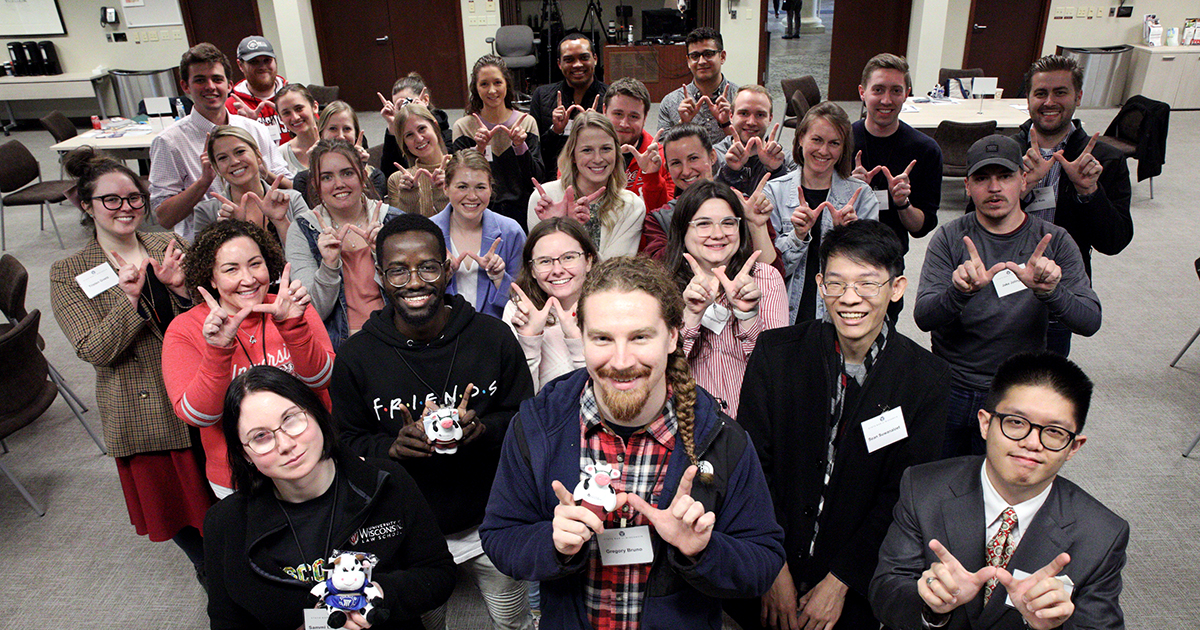
The U.W. Lawyering Skills Class visited the State Bar Center on April 6, 2022. The director of the program, Ryan Poe-Gavlinski, is in the 2nd row, left.
The Lawyering Skills Course at the University of Wisconsin Law School is a unique opportunity for students to learn how to practice law in the “real world.” Students learn legal skills from practicing lawyers from all over Wisconsin through simulation.
Each spring semester, 2L and 3L students are exposed to nine substantive areas of legal practice. This all-inclusive course is taught by practitioners and reveals the day-to-day work of practicing lawyers.
About the Course
The course has been an integral part of U.W. Law School curriculum since 1948. The original mission of this course holds true today: to develop a skills-based course that provides the students with the opportunity to practice and learn the fundamentals of lawyering. These skills include client interviewing and counseling, drafting, negotiating, participation in mediation, problem-solving, organizing and managing legal work, and networking.
The course curriculum focuses on distinct practice areas, including local government proceedings, criminal proceedings, residential real estate transactions, divorce proceedings, representing the small business client, landlord-tenant proceedings, estate planning and probate, preparing a case for civil trial, and managing the early years of practice.
In addition, the course offers workshops on other areas of interest, including introductions to immigration law, elder law, guardian ad litem training, abuse and neglect issues, and termination of parental rights. Students are provided with information for doing legal research on a budget and provided with a workshop on wellness to teach students how to take care of themselves as they venture into their careers.
One of the highlights of the semester is a class trip to the State Bar Center in Madison. While at the Bar Center, students are welcomed into the legal profession and provided information on what the State Bar of Wisconsin has to offer to its members. Students are introduced to WisLAP (Wisconsin’s Lawyer Assistance Program), the Ethics Hotline, Practice 411, pro bono opportunities, sections and divisions, State Bar publications, PINNACLE© CLE programs and books, and how to get involved in leadership opportunities.
Learning by Doing
The unique style of the course is what sets it apart from other courses at the law school. The course’s teaching method is “learning by doing.”
 Ryan Poe-Gavlinski,Quinnipiac University 2004, is a clinical director with theU.W. Law School in Madison, where she is the supervising attorney for the Restraining Order and Survivor Advocacy Clinic and the current director of the Lawyering Skills Program..
Ryan Poe-Gavlinski,Quinnipiac University 2004, is a clinical director with theU.W. Law School in Madison, where she is the supervising attorney for the Restraining Order and Survivor Advocacy Clinic and the current director of the Lawyering Skills Program..
Students complete exercises that give them the opportunity to practice real-world skills. The exercises are done through written assignments and simulated role playing. Assignments are designed to assist students in learning how to identify and evaluate a client’s legal problem, devise workable solutions, and put solutions into action.
During a semester, students draft a portion of a will, negotiate a marital settlement agreement, and counsel a client. In turn, visiting faculty review written assignments and provide direct, meaningful feedback. In addition to students receiving quick evaluation of their written work, visiting lawyers provide instruction and guidance during in-class simulations.
Students work in small discussion groups in addition to the larger class throughout the semester. Half of the class involves small discussion groups. Small group work provides students with the opportunity to interact with a small group of their peers and the faculty. Our visiting faculty perform demonstrations, participate in panel discussions, and become a resource for students’ questions about the general practice of law.
Fostering communication among students and guest faculty allow practitioners to serve as role models. Students may not always know what they want their career to look like, so having diverse faculty join the course gives more opportunity for students to ask questions.
Visiting Faculty from Across the State
The program invites practitioners from a wide range of practice, different ages, personal styles, and backgrounds. We also aim to have faculty from all over the state, as many of our students will not be staying in Madison after they graduate.
Visiting faculty are provided with teaching materials for the subject area they are teaching. The materials use practical case scenarios and materials that simulate what may be found any given attorney’s office. With the help of volunteer practitioners, materials are updated every few years so that case scenarios remain fresh and the law is up-to-date.
Visiting faculty are provided with Continuing Legal Education credits for their teaching time with the program, including ethics credits.
Win-win
Lawyers in Wisconsin have a tradition of being a friendly bar, as many experienced lawyers provide guidance, while mentoring and training new lawyers and those with less experience.
The Lawyering Skills Program fosters this style of teaching, while providing an environment for our practitioners-to-be to connect with experienced lawyers in diverse areas of law.
Some of our students have found employment by making these connections while in school, while practitioners have been able to find promising young associates that they hope to hire.
The heart of this program not only provides a practical education for our law students, but helps them make lasting relationships with our visiting faculty as they continue to be a part of our Law School family.
We Need You
If you are interested in participating in the Lawyering Skills Program as a member of our guest faculty or learning more about the program, please reach out to me at
ryan.poegavlinski@wisc.edu.
This article was originally published on the State Bar of Wisconsin's
Agriculture Law and Rural Practice Blog of the Solo/Small Firm & General Practice Section. Visit the State Bar
sections or the
Solo/Small Firm & General Practice Section webpages to learn more about the benefits of section membership.
